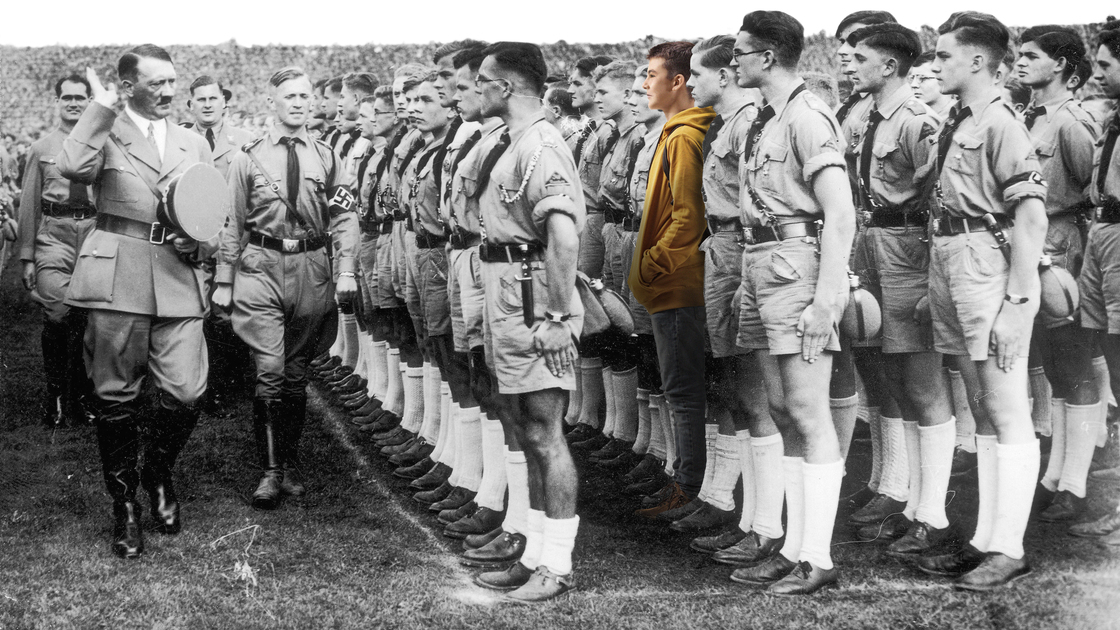It started just like any other day in Palo Alto, California. The students at Cubberly High School walked into history class. On this particular day, their teacher, Mr. Ron Jones, would be discussing the history of Nazi Germany. But then, something different happened. One of the students had a problem with what was being covered. How could the Germans just go along with Nazism? We would never do that.
To answer the question, Mr. Jones secretly devised an experiment.
It started small. When the students arrived to class the next day, he had organized assigned seating and gave them new, strict rules on classroom behavior. He drilled them on the new rules so well that, by the next day, they sat at attention without him even asking. Mr. Jones told the students they were starting a brand new movement, which he called the “Third Wave.” He designed a Third Wave salute (which creepily resembled a Hitler salute) and told the students to use it both in and out of class. The naive students complied. Students from all over the school quickly began to join the movement.
He convinced the students that democracy was weak, and that the Third Wave was a nationwide movement that would fundamentally revolutionize the country. The students bought into it. By the end of the experiment, he had hundreds of students at a Third Wave rally shouting, in unison, “Strength through discipline! Strength through community! Strength through action!”
Anyone caught disobeying the new, strict, authoritarian rules or planning a revolt was to be banished to the school library. He assigned three students to spy on others and turn in those rebelling against the movement; however, about 20 ended up reporting on other classmates for some kind of infraction. Mr. Jones would hold students on trial in class, sometimes convicting students at random. Some students began guard systems to keep the banished in the library. One appointed himself as Mr. Jones’ personal bodyguard for protection. Others had begun physically attacking those who were disloyal to the Third Wave.
It took five days.
The students were shaken when they were told what they had just been a part of. One student, Joel Amkraut, said, “Everyone feels stupid about it. He sure made fools of us. I guess I expected a national leader.”
Mr. Jones had created a police state. And the students just went along with it. A week before, they really believed they would never participate in a movement like that.
As a young person in God’s Church—different from the teens in this world—there are many times that you could simply be swept along: Friday night sporting events or school dances, wrong attire like those around you wear, wrong language that you hear on a regular basis. The real issue that drives most of the items in that list is peer pressure.
When we see people marching in a line, it’s natural to want to step into a line. When we hear people using crude language or taking God’s name in vain, that verbal pattern starts to sound normal even if we aren’t saying those words ourselves. And if everyone around you salutes, you’ll probably salute too, as millions of Germans did.
Romans 12:2 offers a direct warning not to let our actions line up with people in the society around us: “And be not conformed to this world: but be ye transformed by the renewing of your mind, that ye may prove what is that good, and acceptable, and perfect, will of God.”
Sometimes, you have to be willing to stand alone. Exodus 23:2 says: “Thou shalt not follow a multitude to do evil ….” It may be that not following the group will lead to some sort of confrontation. God says not to be afraid of that: “Be strong and of a good courage, fear not, nor be afraid of them: for the Lord thy God, he it is that doth go with thee; he will not fail thee, nor forsake thee” (Deuteronomy 31:6).
There is a similar story in the Bible, but instead of being required to salute, those people were actually required to bow down and worship a statue of the king when music was played—a clear violation of the Second Commandment. King Nebuchadnezzar had constructed a golden idol and commanded all the people in the land to bow down before it when they heard “the sound of the cornet, flute, harp, sackbut, psaltery, and dulcimer, and all kinds of musick” (Daniel 3:10). If the people didn’t obey, they would be thrown into a fiery furnace. The Prophet Daniel’s three friends—Shadrach, Meshach and Abednego—would not bow down.
The courage—really, faith in God and His promises—that those young men showed in that trial is exactly what we need to oppose peer pressure: “If it be so, our God whom we serve is able to deliver us from the burning fiery furnace, and he will deliver us out of thine hand, O king. But if not, be it known unto thee, O king, that we will not serve thy gods, nor worship the golden image which thou hast set up” (verses 17-18).
Your opponent won’t always back down that easily. King Nebuchadnezzar didn’t—he ordered the furnace to be heated seven times hotter! He didn’t back down until God’s servants were literally in the fire, unharmed and walking with a fourth man “like the Son of God” (verse 25). After that powerful display of God’s power, even this Gentile king praised and blessed God, ordered that anyone who spoke against Daniel’s friends be killed, and promoted Shadrach, Meshach and Abednego to high positions in the Babylonian government (verses 28-30).
And God will stand with you too. If you show the faith in God’s promises and obedience to His law that He requires and desires from you, He will bless you in countless ways as He did Shadrach, Meshach and Abednego.
